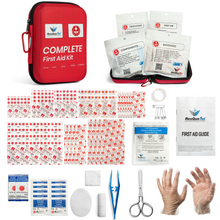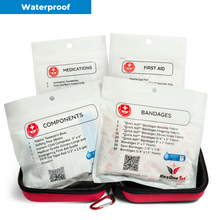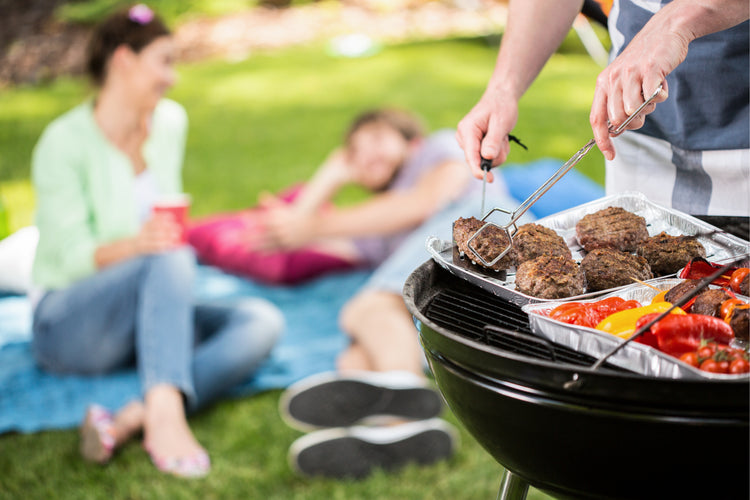Your backyard can be a paradise. It can also be a place with a high risk for injuries. Respond quickly and effectively when the unexpected strikes by becoming familiar with the most common backyard mishaps.
Cuts and Scrapes
The most common injuries in your backyard involve breaking the skin in some way. This can range from a minor scrape to a life-threatening wound.
Small injuries can be treated at home with what you'd find in a first aid kit:
- Wash the injured area thoroughly with soap and water, then apply an antibacterial ointment.
- Cover it with an appropriately sized bandage.
- Keep the injury site clean and dry for the next few days.
Deeper wounds may require medical attention. If you receive a cut that is bleeding heavily, apply steady pressure for five to ten minutes. If the bleeding persists, see a doctor.
Cuts that are particularly deep, have ragged edges, are wide enough that you can't get the edges together with gentle pressure, or have dirt or debris in them should be seen by a medical professional as soon as possible.
Pulled Muscles
Working in the back yard puts you at risk for pulled muscles. Muscle strain can be safely treated at home. If you experience muscle pain while gardening or exercising outside, stop what you're doing immediately.
Get to a place where you can relax, then remember the acronym RICE: rest, ice, compression, and elevation.
Get off your feet, prop the injured area above your heart, apply ice for 15-20 minutes at a time, and consider wrapping the injury with an elastic bandage.
Over the counter pain medications can help with swelling and discomfort.
If a few hours pass and you are in significant pain, have a fever, or have significant swelling, it's time to be seen by a medical professional.
Burns
Backyards and grilling go hand in hand. But what do you do if you burn yourself while slaving over your steak?
The first thing to do is take a look at the area.

If your skin blisters immediately, their appears to be deeper damage to the skin (see graphic above) or if the burn goes deep enough to impact your muscle or bone, you may have 3rd or 4th degree burns--get to an emergency room right away.
First and second degree burns are safe to treat at home.
If your burn is relatively minor, immerse the area in cool water for ten to fifteen minutes. Take an over the counter pain reliever to reduce discomfort and swelling.
Consider applying burn ointment or aloe vera to the burned skin. Avoid remedies like applying milk or butter - this can actually increase your healing time. Protect the burned area by covering it with a bandage.
Insects Bites
Outdoors and insects go hand in hand. It doesn't matter if you're in the back yard or on the trail - bug bites are an annoyance at best and a big problem at worst. Your best offense against bites is a good defense. Wear long pants and sleeves if you plan to be in an area with a large insect population. A good insect repellent is also a must for staying bite free.
If you do receive a bite, wash the area with soap and water. A layer of hydrocortisone cream will help keep itchiness at bay. This is a good thing, as you'll want to avoid scratching the area as much as possible.
Ticks can be an especially tricky problem, particularly if the ticks in your area are known to carry Lyme's disease. If you find a tick on your body, remove it with tweezers and save it in a plastic baggie in case a doctor needs to see it later. Keep a close eye on the area over the next few weeks. If a bullseye rash develops, make an appointment to see your doctor soon.
Foot Pain
There is no end to things to lift and move in the backyard: bags of gardening soil, bricks, concrete blocks, furniture.
If you drop something heavy on your foot, your first response should be to examine the area. Treat any wounds that may have occurred, either by using the methods listed above or, if necessary, by visiting a doctor.
Once any wounds are treated, your next line of attack is RICE. You can also take an over the counter pain reliever to treat swelling and discomfort.
Stay off your feet for the next few hours. If your pain and swelling lessens, continue to treat at home. Stay sitting or lying down as much as you can and avoid doing anything that makes your pain worse. If your pain grows, visit your doctor as soon as possible to determine if you've broken a bone.
Like all first aid incidents, it's all about knowing what to expect and being prepared if you want to reduce the impact.
Hopefully these points help you do that!









